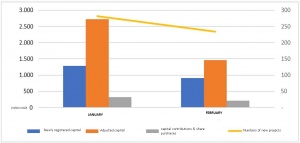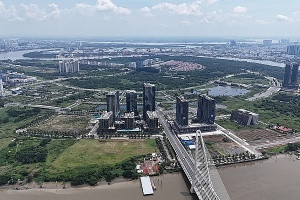INTERNATIONAL INVESTMENT
AND PORTAL
Europe and Vietnam have fostered strong ties since the establishment of diplomatic relations in 1990, and the progress Vietnam has achieved since then is truly remarkable.
Being based in Haiphong, I have witnessed first-hand how this once-quaint river port town has transformed into a key logistics and manufacturing hub for the north – just one example of Vietnam’s broader economic transformation.
 Bruno Jaspaert, chairman, European Chamber of Commerce in Vietnam
Bruno Jaspaert, chairman, European Chamber of Commerce in Vietnam
European businesses are honoured to contribute to this success, but there is potential to do even more. To fully realise it, we must work together to address the bottlenecks investors face.
If my years in Vietnam have taught me one thing, it is that challenges exist – but for every challenge, there is also a solution.
Today’s dialogue is an opportunity to exchange perspectives, strengthen collaboration, and reinforce our shared commitment to a thriving, resilient, and forward-looking economic partnership with a focus on sustainability.
To attract more European investors, we believe it is necessary to highlight some must win battles for the future ahead.
Firstly, strengthening the legal framework is the foundation for sustainable growth. Right after Typhoon Yagi in September, I took my motorbike around Haiphong city, and it was impressive to find all the houses still standing strong. The reason why they kept standing is that they were built on solid foundations. The same applies to the country.
The foundations of any state and economy are its legal framework. All investors crave stability and transparency, especially regarding the laws governing and impacting their business.
For that reason alone, it is crucial that Vietnam establish a transparent and stable legal framework to become a top investment destination. If we get the foundations right, building a house becomes much easier.
Second is reducing trade barriers. The EU-Vietnam Free Trade Agreement has already implemented tariff reductions for bilateral trade. However, domestic taxes and technical trade barriers should not be used to offset the benefits of these agreements.
Third is enhancing foreign investment appeal. Since 2011, we have published the quarterly Business Confidence Index (BCI) to assess business sentiment on Vietnam’s economic outlook.
In our latest BCI report, three in every four European businesses recommended Vietnam as an investment destination. Despite geopolitical situations, more than 70 per cent of European businesses are expressing their confidence in Vietnam and plan to expand their footprint, investment, and/or production here.
However, to further enhance Vietnam’s attractiveness, we must streamline administrative procedures to remove persistent bottlenecks.
Three key areas for improvement, consistently highlighted by businesses via our BCI surveys are reducing regulatory burdens on businesses investing and operating in Vietnam; standardising company establishment and investment registration procedures nationwide to minimise provincial inconsistencies; and simplifying the requirements for work permits to bring in more international experts.
Fourth is elevating national branding. Greater investment is needed to promote Vietnam not only as a premier tourist destination but also as a thriving hub for international business.
Over past years, Vietnam has demonstrated remarkable economic growth, surpassing expert projections, with GDP growth exceeding 7 per cent last year. The Year of the Snake will bring further opportunities, and we must enhance visibility to engage more European companies. Europe has a strong tradition of dynamic, family-owned small and medium-size enterprises, and we hope to establish a Vietnam Connect programme to encourage these businesses to choose Vietnam as their next home.
We are not just here to present challenges but to work collaboratively on solutions. Our goal is to contribute to reducing administrative barriers by at least 30 per cent, aligning with Party General Secretary To Lam’s call for Vietnam’s broader economic reform objectives.
Through our Whitebook, which is set to launch next month, we will provide concrete recommendations to address these issues and foster an even more attractive investment climate.
 FDI inflows rise 35 per cent in first two months
FDI inflows rise 35 per cent in first two months
Vietnam reported more than $6.9 billion in foreign direct investment (FDI) in the first two months of the year, an on-year increase of 35.5, according to data from the Foreign Investment Agency (FIA) under the Ministry of Finance.
 FDI flows to Ho Chi Minh City hit $365 million in first two months
FDI flows to Ho Chi Minh City hit $365 million in first two months
In the first two months of 2025, Ho Chi Minh City has lured $365.8 million in foreign direct investment (FDI) capital, a remarkable increase of 87 per cent on-year.
By Bruno Jaspaert



















